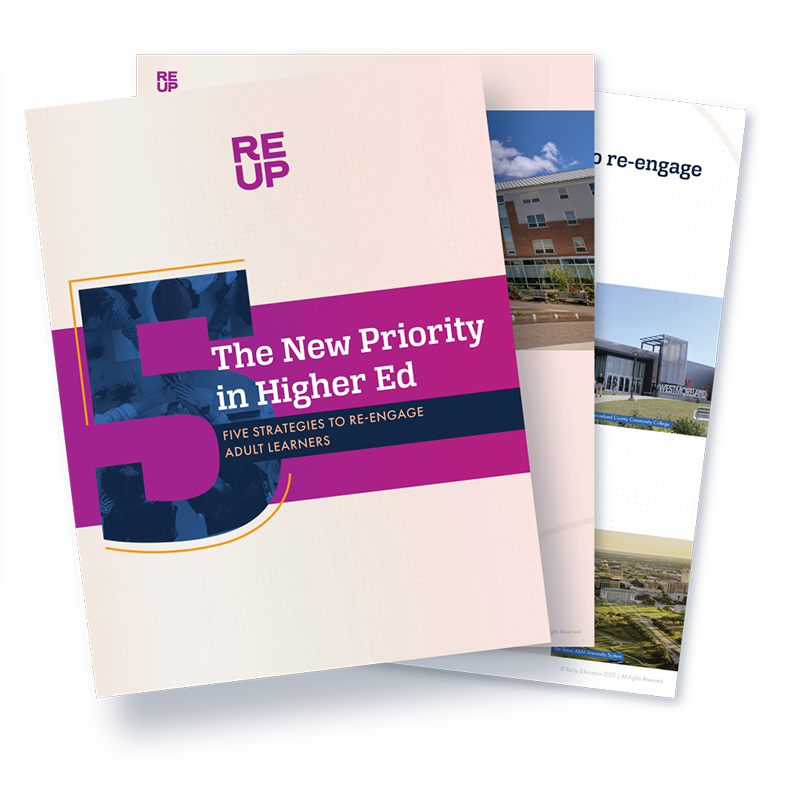Top Insights About Adult Learners Every Institution Needs to Know

Limiting your focus to traditional-age students restricts your ability to grow enrollment and meet the needs of adult learners. By adopting a broader approach, your institution can connect with thousands of potential learners and make a greater impact.
When it comes to higher education, one group of learners is often overlooked despite their incredible potential—adult learners. Did you know that over 40 million Americans have started college but never finished? That’s more than the membership of AARP. This group represents a powerful opportunity for colleges and universities to not only reverse declining enrollment trends but also foster equity and workforce readiness.
To effectively serve adult learners, institutions must understand their unique needs and the challenges they face. Here, we offer two key insights every higher education leader should know about this population, paired with actionable recommendations for turning these insights into results. For the full list, download our newest guide The New Priority in Higher Ed: Five Strategies to Re-Engage Adult Learners.
The real barriers are life circumstances, not academics
What holds adult learners back:
Contrary to assumptions, most adult learners pause college due to life circumstances such as financial pressure or family responsibilities—not academic shortcomings. Through our work, we’ve learned that financial pressure is the top reason learners leave higher education (named by 27%).
Why it matters:
Understanding what truly drives adult learners to leave higher education lets institutions design real solutions rather than relying on outdated assumptions about lack of drive.
What you can do:
- Address financial concerns. Debt forgiveness, fee elimination, childcare options, and transportation assistance can make a powerful difference. Highlighting these services in your outreach demonstrates your understanding of their challenges.
- Support work-life balance. Flexible scheduling, evening classes, and online learning opportunities can empower adult learners to fit education into their busy lives.
For example, university systems like Texas A&M have eliminated application fees for returning adult learners—a small change, but one that significantly reduces barriers to re-enrollment.
Re-enrollments extend beyond recent college stopouts
Broadening the focus:
It’s a common misconception that only those learners who stopped out recently—within one to two years—or those near completion are viable potential re-enrollees. However, recent stopouts account for just 12% of the overall stopout population. Many who left five, ten, or even twenty years ago are equally eager to return under the right circumstances.
Why it matters:
Focusing solely on one group of learners limits your ability to truly impact institutional enrollment and better serve the wider adult learner population. A broader approach captures potentially thousands more learners for your institution.
What you can do:
Develop targeted re-entry support systems tailored for learners based on how long they’ve been out of school. Institutions like Old Dominion University provide unofficial transcript audits and streamlined application processes for individuals returning after significant time away. Adding support like technology onboarding sessions or academic refreshers can encourage adult learners to re-engage, no matter how long it’s been.
Make it clear through personalized communication that it’s never too late to finish what they started.
Get even more adult learner strategies
This blog offers two powerful strategies to re-engage adult learners—but why stop there? ReUp’s free guide, The New Priority in Higher Ed, delivers more actionable insights and proven approaches to better support adult learners. Get the guide and enable your team to create lasting, impactful change.
Adult learners are the future of higher ed
Adult learners are a critical, untapped demographic in higher education. Understanding their academic strengths, motivations, and real-life barriers helps institutions create supportive, intentional policies that meet their needs and smooth their return to college.
Begin by asking yourself the tough questions: Does your current system create unnecessary challenges? Are there hidden barriers keeping adult learners away? Would flexible models or financial resources expand access and equity? For an assessment of where your institution currently stands with adult learners, take our online quiz. For more inspiring success stories, check out our case studies.
Let’s start the conversation
Schedule a call with a ReUp team member to learn more about what a ReUp partnership could do for your institution.
